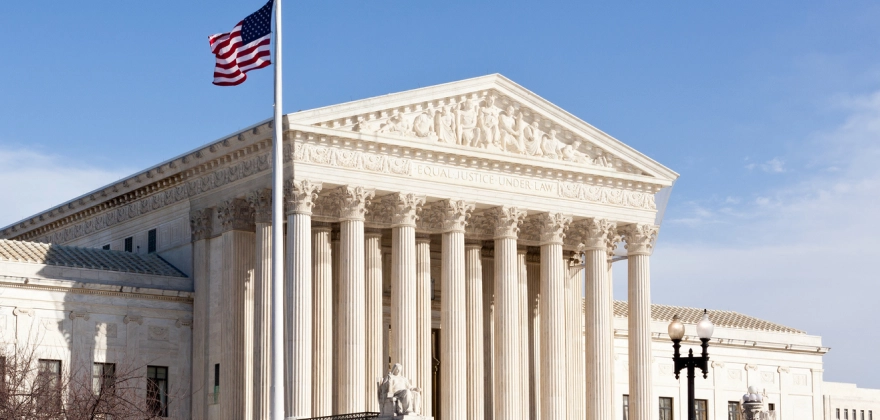Supreme Court Decides Advocate Christ for HHS But Leaves Open Challenges to CMS’s Exclusion of Additional Codes Denoting SSI Entitlement

On April 29, the Supreme Court issued its much-anticipated opinion in Advocate Christ Medical Center v. Kennedy, interpreting the phrase “entitled to supplementary security income [SSI] benefits” for purposes of computing Medicare Disproportionate Share Hospital (“DSH”) payments. The 7-2 majority affirmed the interpretation advanced by the Department of Health and Human Services (“HHS”) that SSI benefits can only mean SSI cash benefits determined on a monthly basis and foreclosing the inclusion of days where patients are eligible only for non-cash SSI benefits. Importantly, the Court’s narrow decision expressly declined to consider significant questions raised by hospitals, over HHS’s use of a limited universe of codes denoting SSI-entitlement, where additional codes also show that a beneficiary is entitled to SSI cash payments.
Therefore, hospitals should continue to protest on their Medicare cost reports and appeal HHS’s restrictive selection of codes used to denote SSI entitlement for purposes of determining DSH payments.
Background
The Medicare DSH statute is intended as a lifeline to DSH hospitals for the more costly care that they provide to low-income Medicare patients. A key factor for determining DSH payment eligibility and amounts is a hospital’s disproportionate patient percentage, which is the sum of two fractions intended to provide a proxy for the amount of care provided to low-income patients.
Advocate Christ involved the “Medicare/SSI fraction,” which computes the portion of a hospital’s total inpatient days treating patients “entitled to” Medicare benefits for which the patients were also “entitled to” SSI benefits.” HHS has simultaneously interpreted “entitled to” Medicare benefits broadly and “entitled to” SSI benefits narrowly, resulting in smaller disproportionate patient percentages and lower DSH payments. Further, as the hospitals and amici in Advocate Christ explained, systemically restricting the definition of low-income patients also results in some hospitals failing to (1) meet the 15% threshold to qualify for any DSH payments and for any Uncompensated Care DSH payments, (2) qualify for the 340B drug discount program, and (3) keep their doors open for service at all.
The hospitals in Advocate Christ challenged the calculation of their Medicare/SSI fractions, arguing that HHS unlawfully limited the count of SSI-entitled Medicare inpatients to those entitled to SSI cash payments for the month of their hospital stay. The hospitals argued for a broader reading of “entitled to [SSI] benefits,” including (1) both cash and noncash SSI benefits and (2) eligibility that begins when a person qualifies for the SSI program and ends when eligibility for the SSI program is terminated. The hospitals based their arguments, in part, on HHS’s expansive interpretation, upheld previously in Becerra v. Empire Health Foundation, of the phrase “entitled to” Medicare benefits as including all days where a patient “qualif[ies] for the program, regardless of whether they are receiving Medicare payments for part of all of a hospital stay.”
Supreme Court’s Decision
Based on their reading of the text of the statute governing the SSI program, the majority agreed with HHS that the SSI benefits referenced in the DSH statute are clearly “cash benefits” and upheld its interpretation of the DSH statute that only persons “eligible to receive an SSI cash payment” during the months of inpatient hospitalization are included in a hospital’s Medicare/SSI fraction. The Court rejected the hospitals’ arguments that a variety of non-cash benefits should also count or that individuals that are not eligible for a cash payment in a particular month are still considered “entitled to [SSI] benefits” until reapplication is required due to 12 consecutive months of ineligibility.
Importantly, however, the Court expressly left open the question whether HHS unlawfully excluded from the numerator of the Medicare/SSI fraction those Medicare inpatients that were assigned SSI codes other than the three recognized by HHS. The Supreme Court explained that “[t]o calculate the number of people eligible for SSI benefits in a particular month, HHS obtains data from the Social Security Administration ([“SSA”]) that seeks to ‘capture all SSI-entitled individuals during the month(s) that they are entitled to receive SSI benefits.’” HHS has limited the dozens of SSA payment status codes to only three showing payment of full monthly SSI cash benefits. Hospitals (including those in Advocate Christ) have argued that HHS’s code selection is overly restrictive and that additional SSA payment codes also satisfy even HHS’s narrow interpretation of “entitled to” SSI benefits. The Court noted an example of potential additional codes might include “patients who fail to receive payment during their month of hospitalization due to reasons unrelated to income.” Indeed, as the dissent notes, “[t]he Government has at least conceded that . . . a patient [should] be counted . . . even if he doesn’t actually receive an SSI payment in a given month (e.g., because the enrollee moves or the post offices loses the check), so long as he ‘satisfies the statutory requirements for a cash payment during the relevant month in question.’”
Take Aways
The Supreme Court left the door open for hospitals to challenge HHS’s failure to use additional codes showing eligibility for a cash payment when determining the days for which Medicare inpatients are “entitled to” SSI benefits. The impact of such additional code days can be significant, particularly for hospitals that are on the bubble for DSH eligibility. Therefore, hospitals should continue to protest on their as-filed cost reports and file Board appeals of their Medicare DSH payments on the basis of unlawfully low Medicare/SSI fractions due to HHS’s failure to consider additional SSA codes that denote SSI entitlement.
Professional
HLB is continuing to analyze the impact of this opinion for our clients, in particular with respect to ongoing and future litigation. For questions, please contact Sven Collins, Kelly Carroll, Bob Roth, Katrina Pagonis, David Vernon, Lloyd Bookman, Nina Marsden, Rachel Zacharias, or your regular HLB contact.



